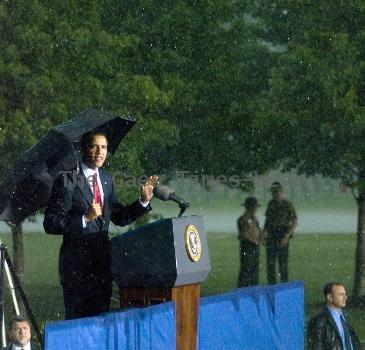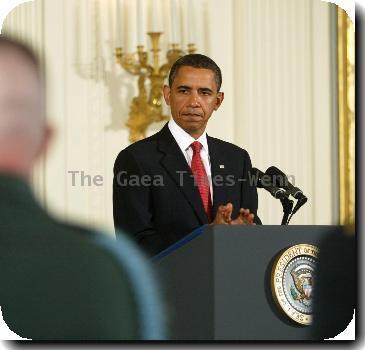Once celebrated as a tea party hero, Sen. Scott Brown opts for middle ground in Massachusetts
By Andrew Miga, APFriday, September 10, 2010
Sen. Scott Brown showing a more moderate face
WASHINGTON — Sen. Scott Brown, once celebrated by tea partiers, has pulled the political equivalent of knocking over the china: He’s displayed a moderate streak.
A surge of tea party support helped catapult the upstart Brown into the late Sen. Edward Kennedy’s seat in Democratic-dominated Massachusetts last January and made him an overnight political sensation, but Brown has been slow to return the favor. The man who was hailed as the face of the GOP resurgence has instead showed his independence. Those tea party cheers have turned to jeers.
Brown’s centrist course is a matter of political survival: He’ll likely face a tough re-election fight in one of the more Democratic states in 2012. His balancing act is playing out amid the broader battle between the GOP establishment and energized tea party activists in primaries for the fall midterm races.
“My voting record speaks for itself,” Brown told The Associated Press in an interview earlier this year. “The biggest marker is that a lot of people on both sides of the aisle don’t know how I’m going to vote.”
Republicans fumed when Brown bolted the GOP and handed Senate Democrats key votes on a major jobs bill and a sweeping financial reform plan.
His centrist streak was underscored again recently when he traveled cross-country to raise money for mostly moderate, establishment Republican candidates in competitive races. Brown’s trip did not include stops for tea party favorites for Senate such as Nevada’s Sharron Angle, Kentucky’s Rand Paul or Colorado’s Ken Buck.
“I think he could be an asset to liberal Republicans in the 2010 election cycle, but with his votes on financial regulation the tea party movement can’t trust him,” said Shelby Blakely, a leader of the Tea Party Patriots, a national group.
Brown appeared at fundraising events for GOP Senate candidates Mark Kirk in Illinois, Dino Rossi in Washington and Carly Fiorina in California. He raised money in Ohio for Steve Stivers and Steve Chabot, who are in hotly contested races to reclaim the GOP seats they once held in the House.
“We’ve had lots of requests to help candidates,” said Eric Fehrnstrom, a top Brown adviser. “Senator Brown will do what he can, but he won’t be able to get involved in every race.”
Brown’s star power, coupled with his message of creating jobs and cutting out-of-control government spending, played well, Chabot said.
“People knew who he was and were anxious to see him,” said the former seven-term congressman.
Chabot said he wasn’t bothered that Brown isn’t as conservative as he is on issues like abortion.
“He’s in Massachusetts and I’m here in Ohio,” Chabot said. “I’d be a lot closer to him than Teddy Kennedy.”
Conservative groups like the tea party movement poured hundreds of thousands of dollars into TV ads for Brown in the crucial final weeks of his race against Democrat Martha Coakley. They trumpeted the symbolism of a Republican winning the seat Kennedy had held for nearly a half-century.
After he ran as the 41st senator who could join GOP filibusters to block President Barack Obama’s domestic agenda, Brown’s more moderate bent has made him a target for conservatives.
Tea party favorite Sarah Palin mocked Brown recently, saying in a Fox Business Network interview that while Massachusetts may “put up with” Brown, conservatives in her home state of Alaska wouldn’t. Brown had skipped an April tea party rally in Boston featuring Palin.
After Brown voted for the Senate financial overhaul bill, tea party activists protested outside his office. On conservative websites, blogs and even on Brown’s own Facebook page, former backers branded him a traitor — and worse.
“You are a liar and a disappointment to the voters who believed you were going to help us,” one former supporter seethed on Brown’s Facebook page.
Brown calls himself a “Scott Brown Republican” or “Massachusetts Republican” who usually votes with the GOP but is willing to work with Democrats, particularly when it benefits his state. He defies easy labels.
He says he’s a fiscal conservative, but he voted for a big-ticket Democratic jobs bill soon after joining the Senate. Brown did not join a handful of moderate Republicans voting to confirm Elena Kagan to the Supreme Court, citing her lack of judicial experience.
Brown’s occasional forays across the aisle with Democrats play as smart politics in Massachusetts, where more than half the voters are not connected to a party and Republicans are a distinct minority. Moderation is about the only way a Republican can survive.
There’s speculation that Kennedy’s widow, Vicki, might challenge Brown. Democrats will be gunning hard for Brown. Anticipating a tough re-election, Brown has stockpiled more than $6.5 million in campaign cash. His recent trip was a chance to expand his own fundraising network and to build political chits he’ll need in 2012.
Tags: Barack Obama, Edward Kennedy, Facebook, Massachusetts, North America, Political Fundraising, Sarah palin, United States, Washington



